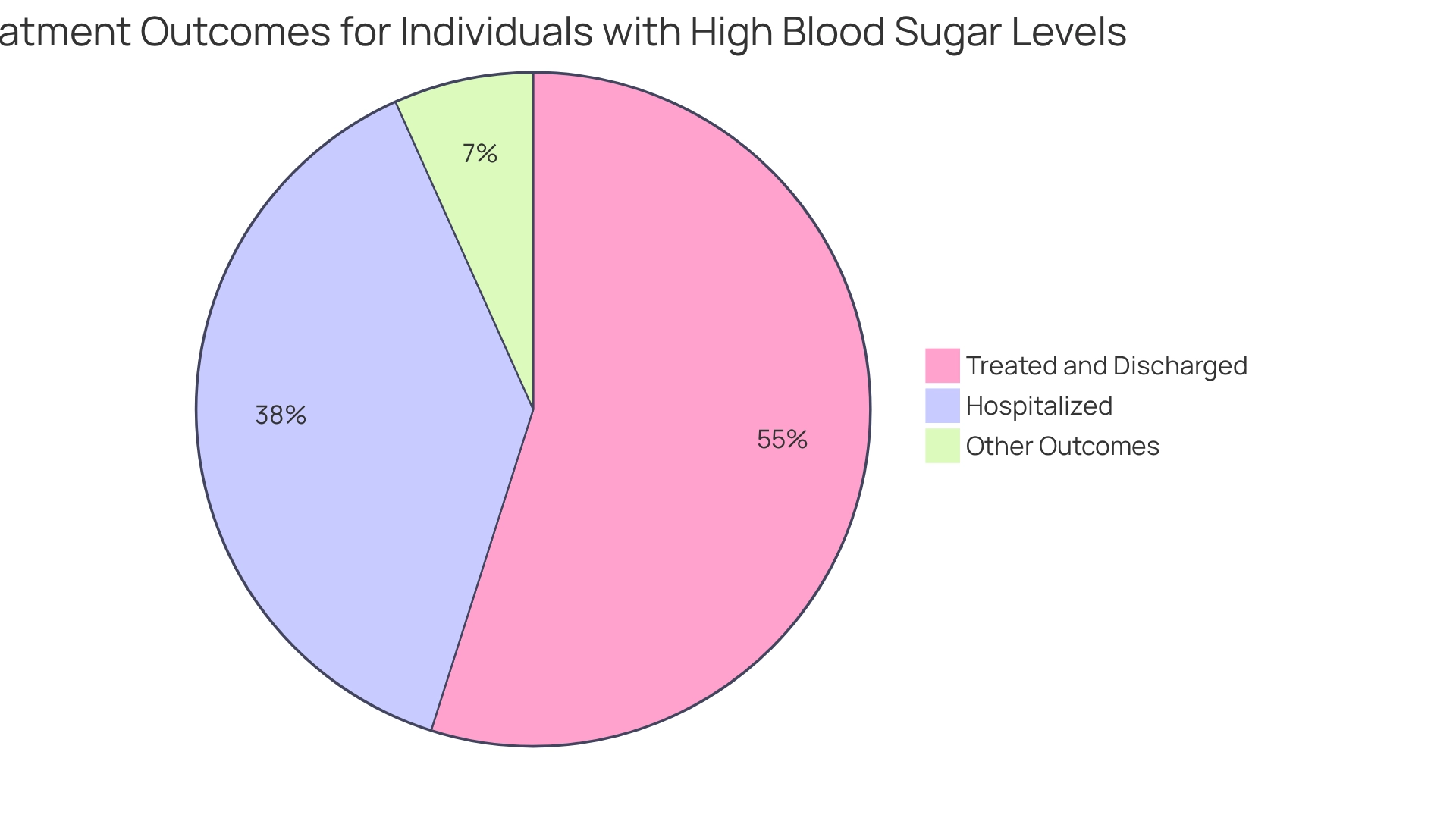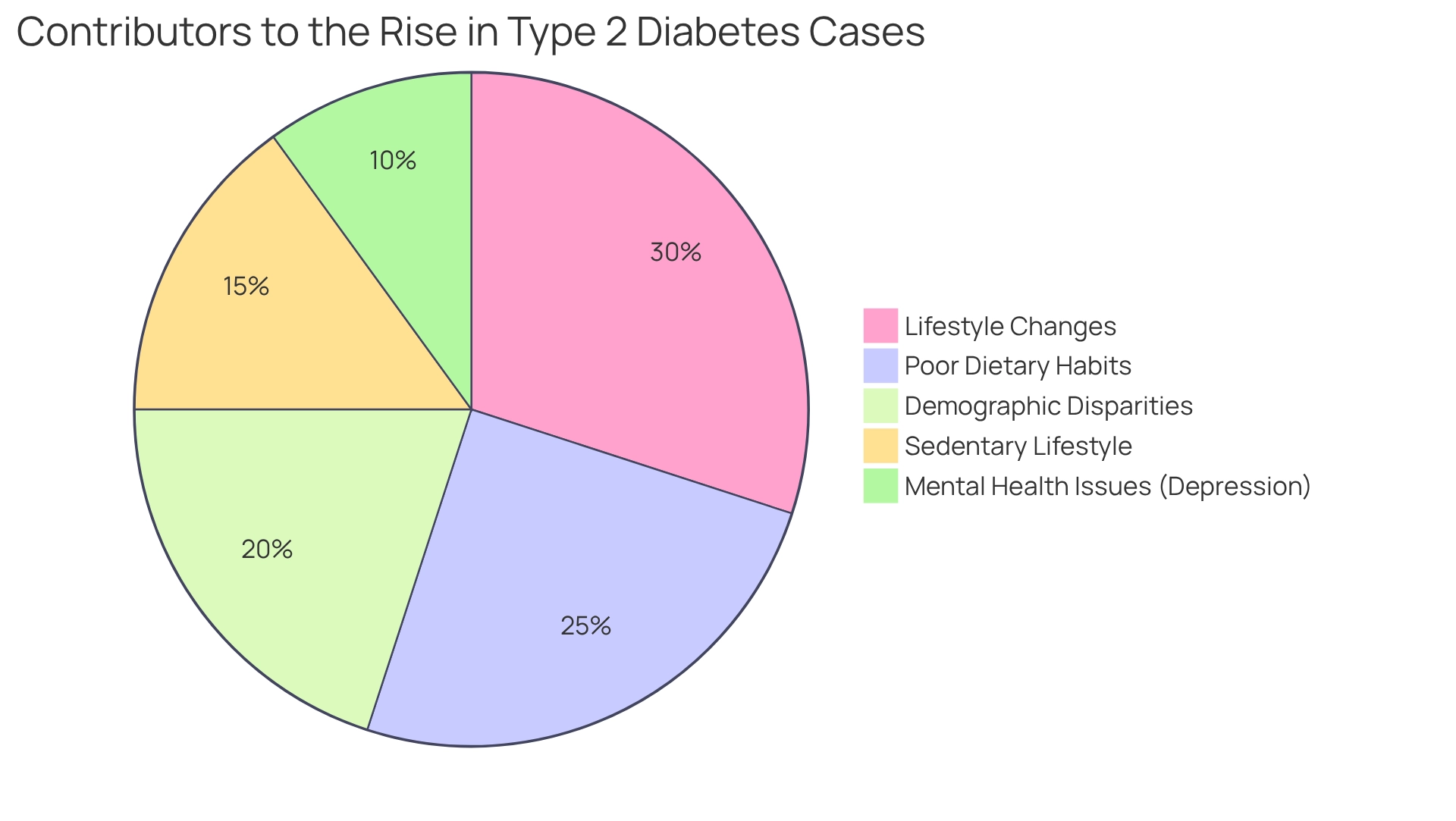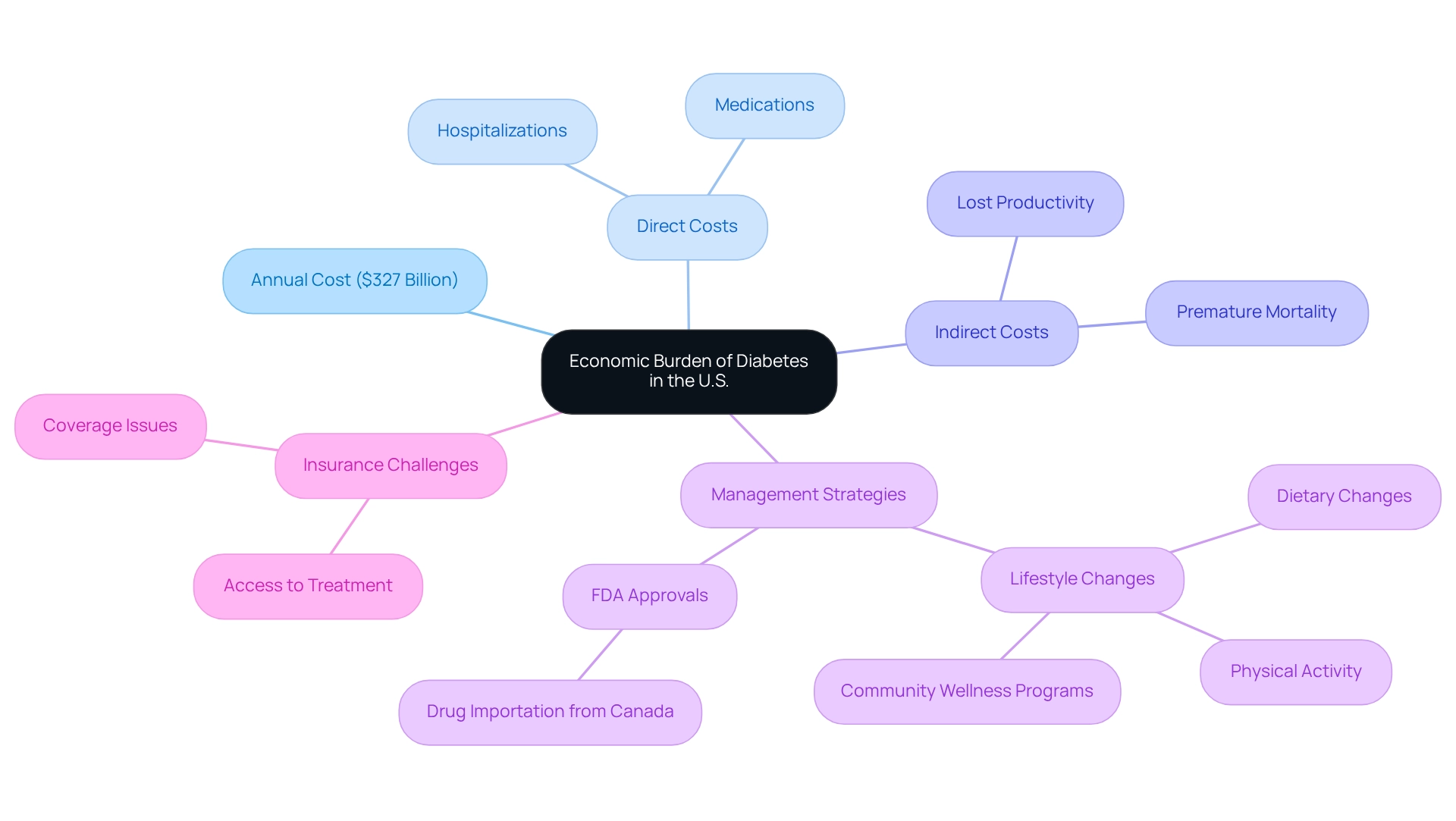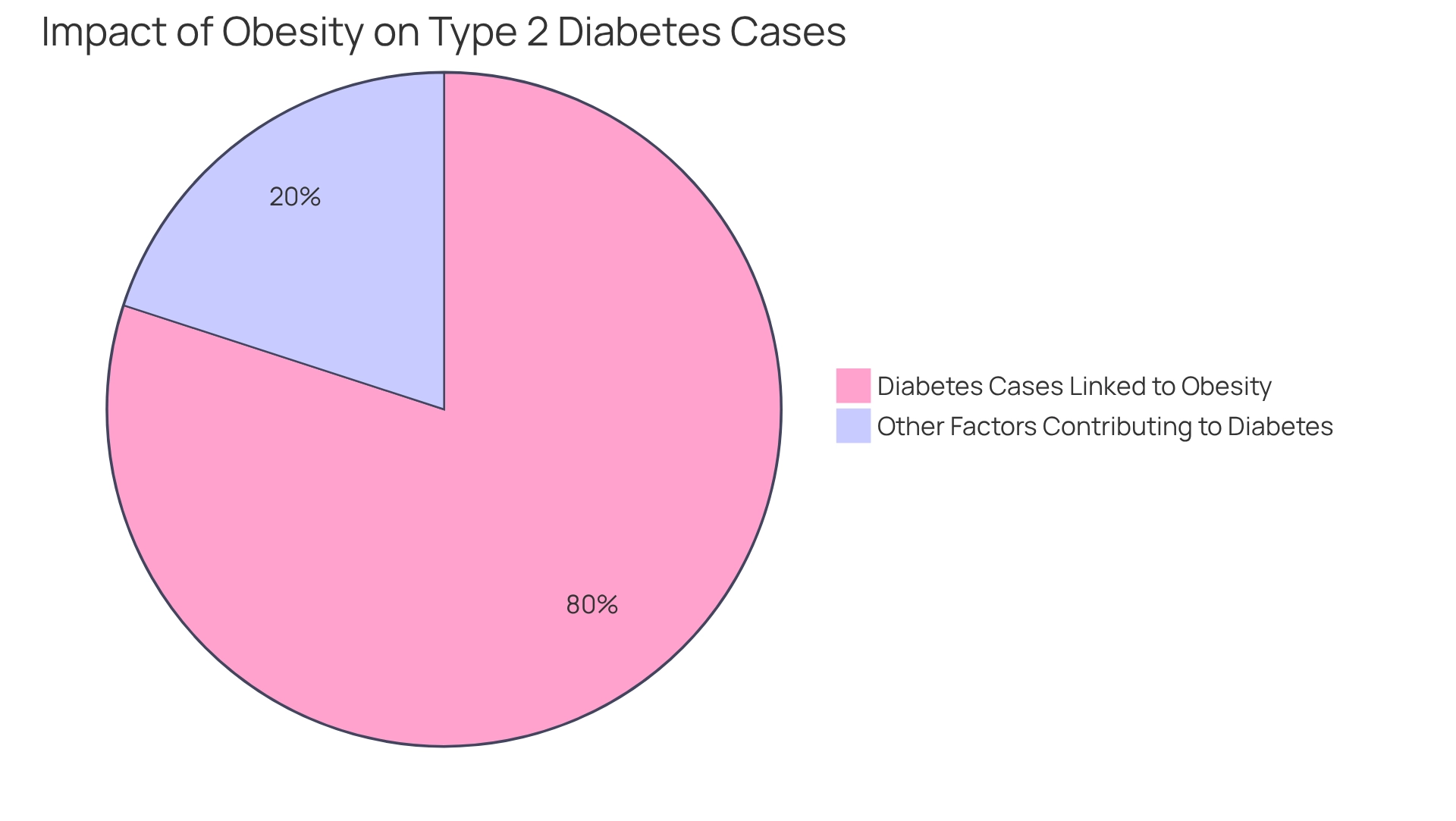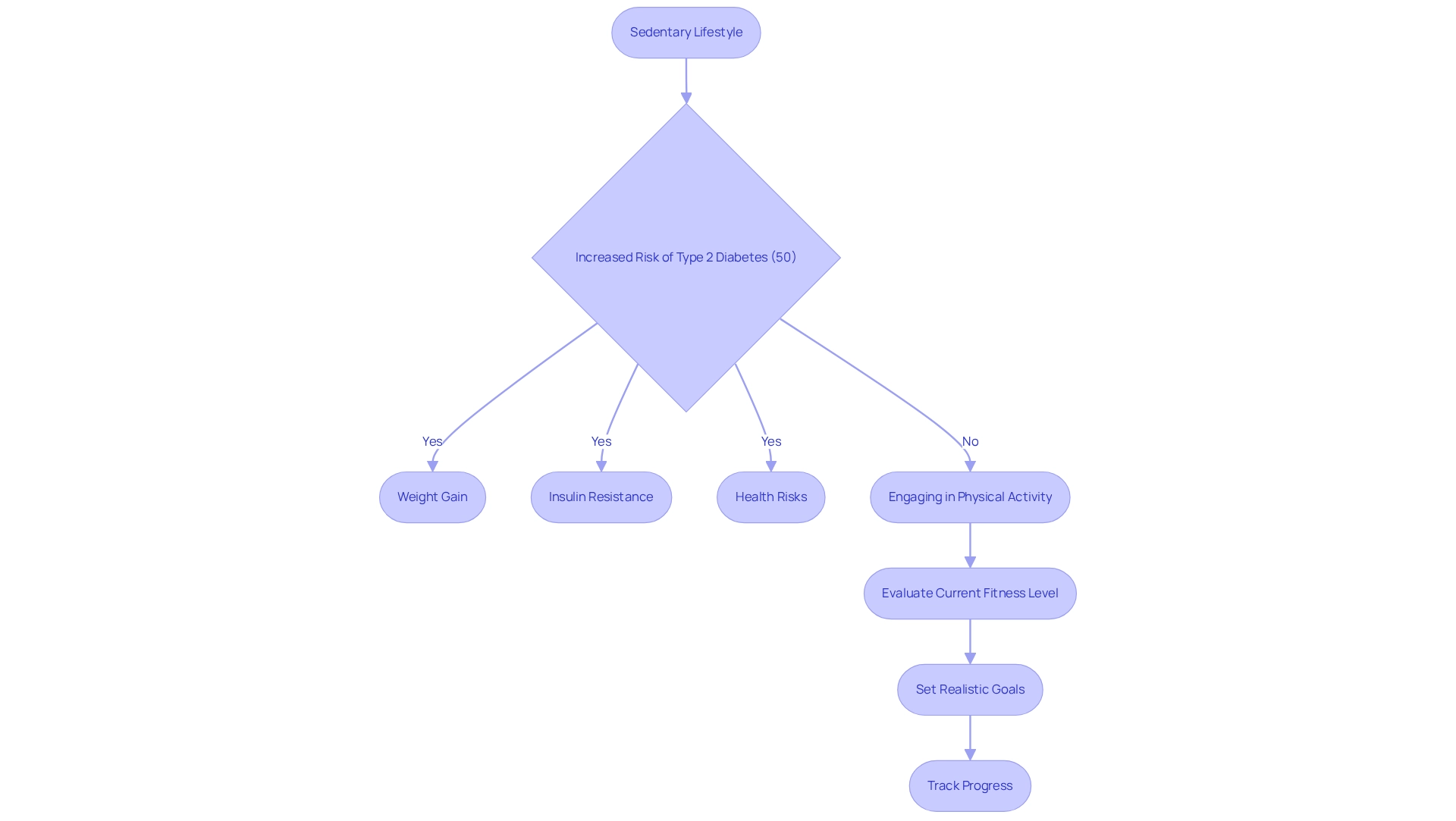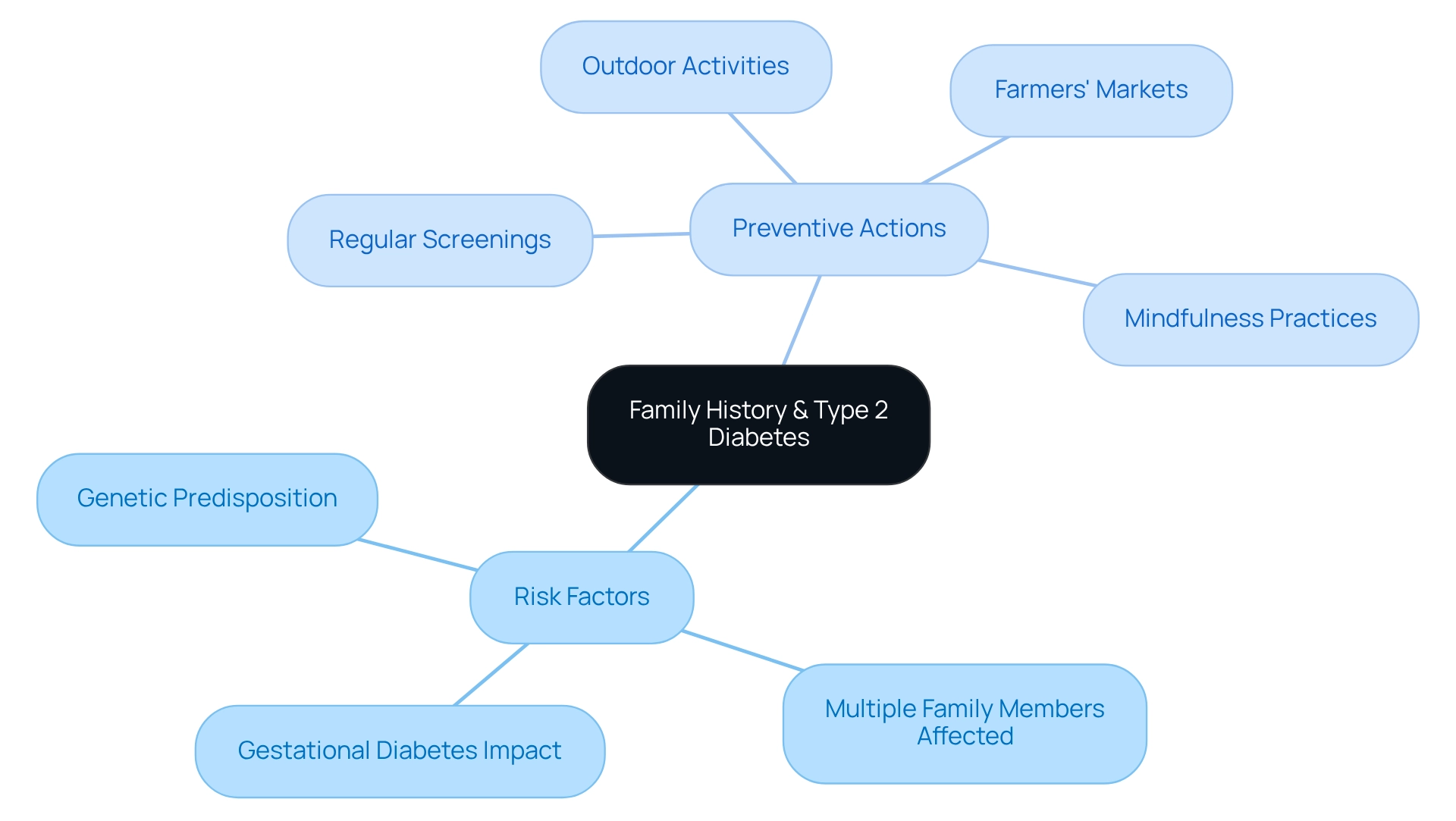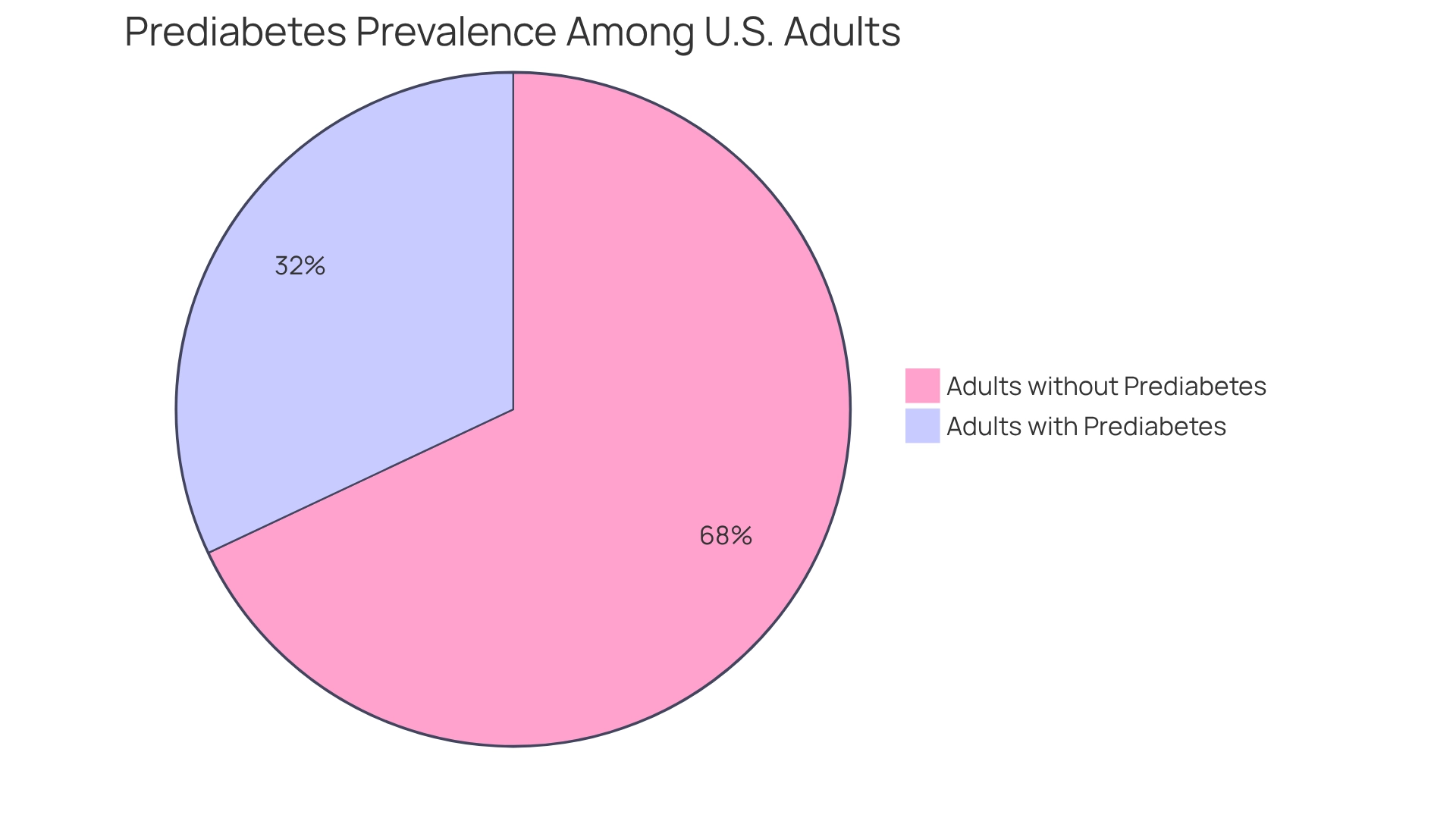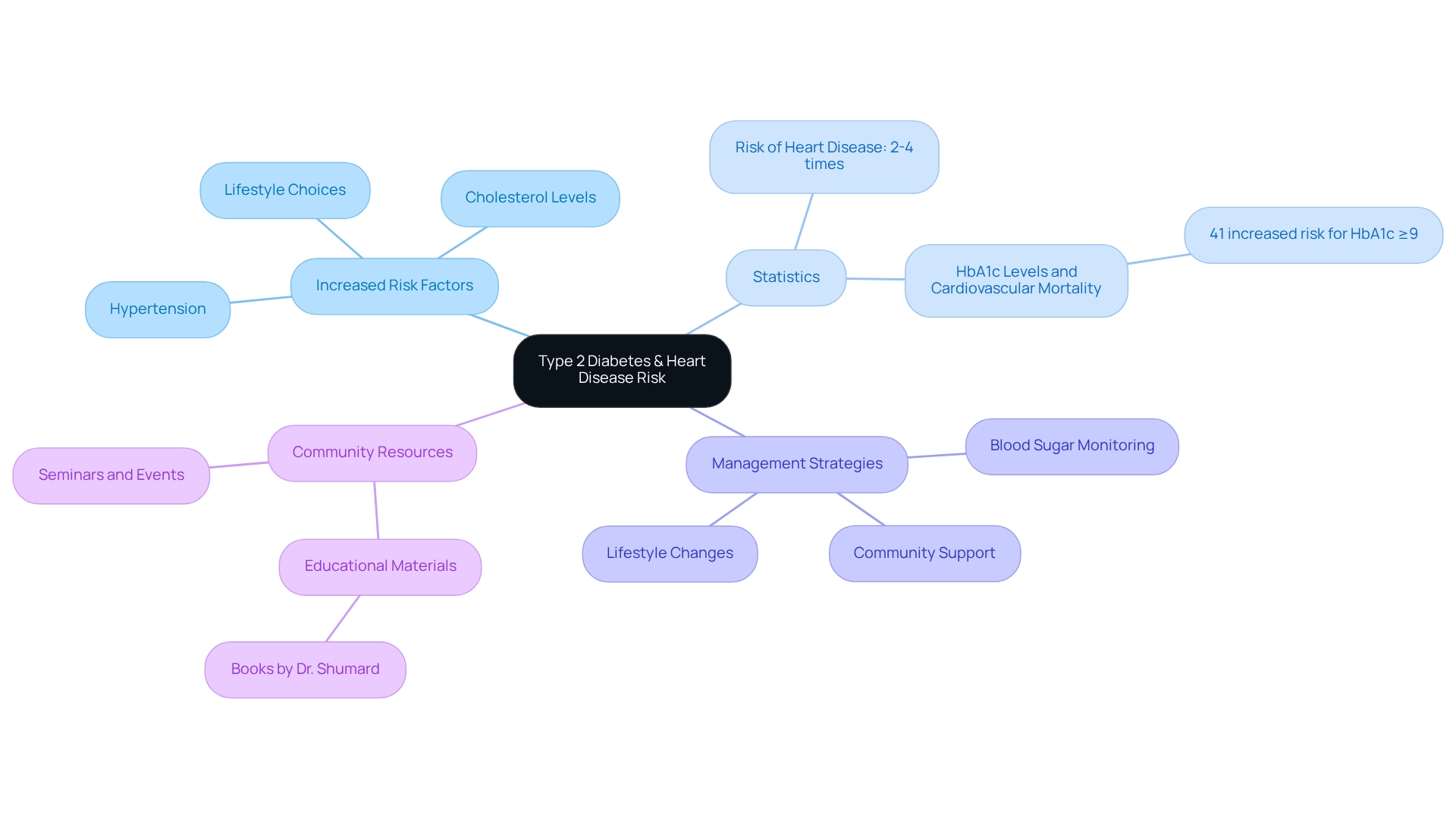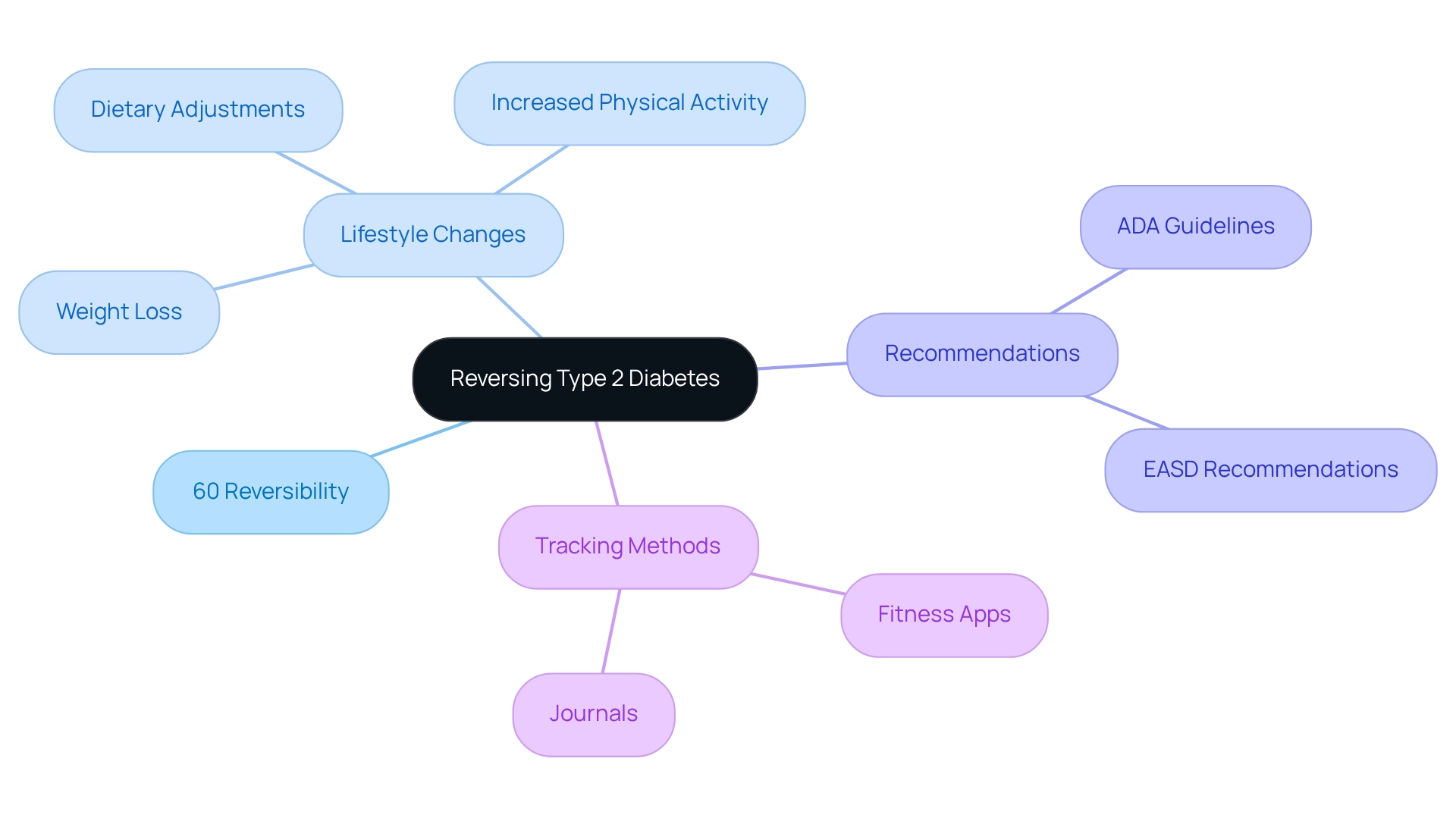Overview
The article titled “10 Essential Diabetes Type 2 Statistics You Need to Know” sheds light on crucial statistics surrounding type 2 diabetes, recognizing the challenges faced by many individuals. It emphasizes the prevalence of this condition, noting that over 422 million people globally are affected. It’s important to recognize that nearly 80% of these cases are linked to obesity, highlighting the urgent need for effective management strategies and lifestyle interventions.
Many patients find that understanding these statistics can be overwhelming, but it’s essential to know that there is hope. With the right lifestyle changes, there is potential for reversal. This information serves not only to inform but also to inspire action toward healthier living. By addressing these statistics, we can foster a sense of urgency and motivate individuals to take charge of their health.
As we navigate this public health crisis, let’s remember that support is available. Together, we can explore effective strategies that empower individuals to make meaningful changes. The journey may be challenging, but it is one that can lead to a healthier, more fulfilling life.
Introduction
In a world where diabetes has reached epidemic proportions—affecting over 422 million individuals globally—the urgency for effective management and prevention strategies has never been more pressing. It’s important to recognize that many people are struggling with this condition. The Integrative Wellness Center’s 30-Day Diabetes Reset Program shines as a beacon of hope, offering a holistic approach that empowers participants to reclaim their health. Through personalized coaching, nutritional guidance, and physical activity recommendations, this innovative program addresses the alarming rise in type 2 diabetes cases, which have surged nearly 20% in the last decade.
Many patients find that understanding the critical link between obesity and diabetes is essential. Approximately 80% of type 2 diabetes cases are associated with excess weight. As individuals embark on this transformative journey, they gain invaluable insights and tools to manage their condition. This program ultimately aims for a healthier future, free from the burdens of diabetes. Together, we can navigate this path towards wellness and a brighter tomorrow.
Integrative Wellness Center: 30-Day Diabetes Reset Program for Lasting Health Transformation
Are you feeling overwhelmed by diabetes? The Integrative Wellness Center understands your struggles and is here to help. Our comprehensive 30-Day Diabetes Reset Program is designed to empower you to take control of your health and well-being. This groundbreaking program combines personalized coaching, nutritional guidance, and physical activity recommendations, all tailored to help you develop sustainable habits.
It’s important to recognize that behavior change is key. By focusing on this aspect, our program equips you with the essential resources needed to manage your condition effectively and enhance your overall health. Many participants find that they not only learn how to control their diabetes but also gain a deeper understanding of their health journey.
As part of the program, you will receive valuable educational materials, including access to enlightening seminars and Dr. Jason Shumard’s insightful book. This straightforward guide reveals the secrets to healing type 2 diabetes, offering you hope and direction.
This comprehensive approach not only encourages a greater comprehension of managing and even reversing your condition but also supports a lasting transformation in your well-being. Remember, you are not alone on this journey. Together, we can pave the way for a healthier, more vibrant life.
Over 422 Million: Global Prevalence of Type 2 Diabetes
Recent diabetes type 2 statistics indicate that over 422 million individuals worldwide are living with type 2 diabetes, highlighting a critical public health crisis that affects many. The World Health Organization has called for immediate action to address this escalating epidemic, intricately linked to rising obesity rates, sedentary lifestyles, and poor dietary habits. As of March 2024, one in eight individuals are impacted by obesity, a major risk factor for developing type 2 diabetes. The diabetes type 2 statistics showed that the crude rate of diabetes-related deaths was 120.3 per 100,000 people in 2021, highlighting the severe implications of this condition.
It’s important to recognize that the influence of obesity on diabetes type 2 statistics and the prevalence of related conditions is significant. Research indicates that effective interventions can lead to considerable decreases in disease rates. For example, information from emergency department visits shows that:
- 54.9% of individuals with high blood sugar levels were treated and discharged
- 38.4% needed hospitalization
This emphasizes the differing severity of emergencies related to this condition and the urgent need for prompt intervention.
Many patients find that transformative experiences, such as those from Dr. Jason Shumard’s 30-Day Diabetes Reset program, demonstrate the potential for holistic health solutions in reversing type 2 diabetes. One patient shared, “I was depressed, no energy, and had insomnia… I was on 2 different meds that weren’t working… When I started this program the Doctor gave great personal attention and care in helping fix my condition. I have lost 55 lbs. My A1C started at 9.1 after 8 months it is now 5.7.” This illustrates the effectiveness of personalized guidance and lifestyle modifications in managing blood sugar levels.
Additionally, the combined issue of undernutrition and obesity in children, especially in low- and middle-income nations, highlights the significance of tackling childhood nutrition to avert future obesity and related health concerns. The current worldwide environment requires a united effort from individuals and healthcare practitioners to emphasize prevention and management approaches. Embracing healthier eating habits, boosting physical activity, and utilizing available resources for managing health conditions are essential for ensuring a healthier future for everyone.
Furthermore, the persistent issues related to hospital safety, including:
- 7,000 wrong medications administered to patients
- 80,000 infections contracted in hospitals
emphasize the essential requirement for enhanced healthcare practices. These improvements are crucial to effectively support individuals with blood sugar management needs.
Type 2 Diabetes Cases Increased by Nearly 20% in the Last Decade
Over the past ten years, diabetes type 2 statistics indicate that diagnosed cases of type 2 conditions have surged by nearly 20%, reflecting a significant public health concern. This alarming increase in diabetes type 2 statistics can be attributed to several factors, including lifestyle changes, poor dietary habits, and a sedentary lifestyle. It’s important to recognize that, according to diabetes type 2 statistics, this condition was responsible for 3.4 million deaths in 2024, equating to one death every nine seconds. This underscores the severity of the epidemic reflected in the diabetes type 2 statistics. People with blood sugar issues often find themselves at a greater risk of experiencing depression, which can complicate management efforts.
Many patients find that the urgency of this situation highlights the critical need for early intervention and education in diabetes management. Programs like the 30-Day Diabetes Reset, led by Dr. Jason Shumard, play a vital role in equipping individuals with the necessary knowledge and tools to reclaim their health and potentially reverse their condition. As one patient shared, “I was depressed, no energy, and had insomnia… When I started this program, the Doctor gave great personal attention and care in helping fix my condition. I have lost 55 lbs, and my A1C has improved significantly.” This transformative experience highlights the effectiveness of a patient-centered approach in reversing type 2 conditions, contrasting sharply with conventional treatments that often depend solely on medication.
Understanding the demographic differences in diabetes type 2 statistics, particularly among American Indians/Alaskan Natives and non-Hispanic Black adults, is crucial for customizing effective public health strategies. As healthcare experts stress, lifestyle modifications are essential in addressing the increasing prevalence shown in diabetes type 2 statistics, making proactive steps more important than ever. Moreover, metformin has been shown to lower the risk of developing the condition by 31% in younger and heavier prediabetic adults, emphasizing the significance of seeking advice from healthcare providers about medication and preventive approaches.
To learn more about how you can take control of your health, contact Integrative Wellness Center today.
$327 Billion: Annual Cost of Diabetes in the United States
Managing diabetes can feel overwhelming, especially when considering the financial implications. In the United States, the yearly expense associated with this condition is projected to reach approximately $327 billion by 2025. This staggering amount includes direct medical costs such as hospitalizations, medications, and outpatient care, as well as indirect costs like lost productivity and premature mortality. It’s important to recognize that this economic burden highlights the urgent need for effective management strategies that not only aim to improve patient outcomes but also alleviate healthcare costs.
Many patients find that investing in lifestyle interventions, such as dietary changes and physical activity, can significantly ease these financial strains. In San Marcos, CA, individuals have the opportunity to adopt a holistic approach to managing type 2 diabetes. By focusing on a balanced diet rich in local produce, participating in regular outdoor exercise, and joining community wellness programs at the San Marcos Community Center, they can take meaningful steps toward better health.
Research suggests that every dollar spent on prevention programs can lead to substantial savings in healthcare expenses. This emphasizes the importance of proactive measures to lessen the economic impact of this chronic illness. As one advocate noted, “Yes, it’s happening worldwide. My charity recently collected anecdotal prices of insulin, and people pay anywhere from $3 to $60 per vial.” This highlights the real-world implications of the costs associated with diabetes and the necessity for advocacy.
Additionally, the recent FDA approval allowing Florida to import prescription medications from Canada marks a significant step in addressing the financial burden of managing health conditions. As diabetes type 2 statistics show a rising prevalence, tackling these financial challenges through education and innovative management strategies becomes increasingly essential for individuals and the healthcare system alike.
However, it’s crucial to acknowledge that insurance coverage challenges often hinder individuals’ ability to meet their daily treatment goals, complicating the financial landscape of diabetes management. For personalized guidance and support tailored to your specific needs, consider reaching out to Dr. Shumard in San Marcos, CA. He can assist you in navigating your health management journey with care and expertise.
80% of Type 2 Diabetes Cases Linked to Obesity
It’s important to recognize that diabetes type 2 statistics show nearly 80% of cases are linked to obesity. Excess body weight significantly contributes to insulin resistance, a key factor in the development of this condition. Many patients find that by tackling obesity through lifestyle modifications—such as adopting a healthier diet and increasing physical activity—they can markedly lower their risk of developing type 2 diabetes. Dr. Jason Shumard at Integrative Wellness Center emphasizes that effective weight management programs are vital in addressing this public health crisis. These programs empower individuals to make sustainable changes that promote overall health and well-being.
Moreover, research suggests that individuals with mild-to-moderate obesity who undergo metabolic surgery experience significant enhancements in glycemic control and weight reduction. A systematic review of over 50 studies found that these individuals achieved notable improvements in blood sugar levels and significant weight loss. This underscores the significance of tackling obesity as a primary risk factor, as shown by diabetes type 2 statistics. Significantly, those who underwent metabolic surgery had a 16.9% risk of microvascular complications at five years, compared to 34.7% for those receiving medical management.
As Dr. Shumard states, “By providing patients with actionable insights and practical tools, the center fosters an environment where individuals can reclaim their health and well-being.” To discover more about how Dr. Shumard can assist you in managing your condition, consider reaching out to Integrative Wellness Center at 858-564-7081. You can also sign up for our upcoming event to obtain valuable resources and support. Remember, taking the first step toward a healthier you is within reach.
Sedentary Lifestyle Increases Risk of Type 2 Diabetes by 50%
A sedentary lifestyle can significantly increase the likelihood of developing type 2 sugar intolerance—by as much as 50%. It’s important to recognize that prolonged periods of inactivity can lead to weight gain and insulin resistance, both of which are crucial factors in the onset of diabetes-related conditions. Insulin resistance in skeletal muscle is a major contributor to the development of type 2 metabolic disorder, fatty liver disease, heart disease, and obesity-related cancers.
Many patients find that engaging in regular physical activity—like walking, cycling, or participating in structured exercise programs—can effectively counteract these risks. To begin a walking routine, individuals should first evaluate their current fitness level and set realistic goals, such as committing to a daily walk of just 10-15 minutes. Compelling evidence from extensive prospective studies since 1990 underscores the importance of regular physical activity and sufficient cardiorespiratory fitness in preventing this condition.
Research has shown that regular physical activity not only aids in weight control but also enhances insulin sensitivity, making it an essential element in the prevention and management of glucose-related disorders. As Elise Liu, an instructor of medicine, notes, “This could be because several types of immune cells have been shown to work better shortly after exercise.” Tracking progress through a journal or app can help maintain motivation and allow individuals to celebrate their achievements along the way.
Including physical activity in everyday habits is crucial for lowering the chances of developing type 2 conditions and improving overall well-being. Dr. Jason Shumard’s center has witnessed transformative health changes in patients who have adopted these lifestyle modifications, highlighting the significance of physical activity in managing blood sugar levels.
Family History: A Major Risk Factor for Type 2 Diabetes
A family background of type 2 diabetes is a significant risk factor that can greatly increase an individual’s chance of developing this condition. Have you ever considered how a parent or sibling diagnosed with diabetes might affect your own health? Studies suggest that those with such family ties face a notably higher risk, especially when multiple family members are impacted. It’s also important to note that infants born to mothers with gestational diabetes may be more prone to developing type 2 diabetes later in life. While genetic predisposition plays a vital role in this increased risk, it’s essential to recognize that lifestyle changes can effectively mitigate these genetic factors.
For those with a family history of this condition, consider these practical suggestions to help lower the likelihood of developing diabetes:
- Prioritize Regular Screenings: Staying proactive with check-ups to monitor blood sugar levels and overall wellness can make a significant difference.
- Engage in Outdoor Activities: Why not take advantage of San Marcos’ beautiful parks and trails? Regular exercise, such as hiking at Lake San Marcos or walking at Discovery Lake, can be both enjoyable and beneficial.
- Shop at Local Farmers’ Markets: Incorporating fresh, local produce into your diet is easier than you think. Visit farmers’ markets to find seasonal fruits and vegetables that are rich in fiber and nutrients.
- Practice Mindfulness: Managing stress is crucial, and mindfulness practices like yoga or meditation can be a great way to achieve this. Many local studios and community centers offer these resources.
By providing individuals with actionable insights and practical tools, Dr. Jason Shumard emphasizes that the Integrative Wellness Center is dedicated to fostering an environment where people can reclaim their well-being. Through educational initiatives and community wellness programs, patients gain valuable knowledge that empowers them to take proactive steps toward improved health and the prevention of diabetes-related issues.
More Than 88 Million Adults in the U.S. Have Prediabetes
Currently, diabetes type 2 statistics indicate that around 96 million adults in the United States are living with prediabetes, a condition marked by elevated blood sugar levels that haven’t yet reached the threshold for diabetes. This concerning statistic underscores the urgent need for early detection and proactive intervention. It’s important to recognize that individuals with prediabetes face a significantly heightened risk of developing type 2 diabetes, which is supported by diabetes type 2 statistics. However, there’s hope—lifestyle changes, such as adopting a healthier diet and increasing physical activity, can effectively reverse this condition.
Dr. Jason Shumard emphasizes, “By offering patients actionable insights and practical resources, the center cultivates an atmosphere where people can regain their wellness and well-being.” To embark on a structured walking program, individuals should first assess their current fitness levels and set achievable goals, perhaps starting with short, manageable walks of just 10-15 minutes. Gradually increasing the duration and frequency of these walks can help establish a consistent routine. Many patients find that tracking their progress through journals or apps not only maintains motivation but also allows them to celebrate their achievements.
Educational initiatives that provide assistance and resources are essential in empowering individuals to take control of their health. This proactive approach can significantly reduce the risk of developing further health issues while enhancing overall quality of life. Transformative experiences shared by those who have participated in Dr. Shumard’s 30-Day Diabetes Reset program illustrate the profound impact of a comprehensive approach to well-being.
As the diabetes type 2 statistics indicate a rising prevalence of prediabetes, addressing this issue through informed lifestyle changes is more crucial than ever. Furthermore, it’s alarming to note that average medical costs for individuals with diagnosed blood sugar-related conditions are 2.6 times higher than those without such conditions, highlighting the financial implications of unmanaged prediabetes. We encourage you to seek out educational programs and resources to manage your health proactively. If you’re interested, call 858-564-7081 to see if you qualify for a FREE consultation.
Type 2 Diabetes Increases Risk of Heart Disease by 2-4 Times
Individuals with type 2 conditions often face significant challenges, including a heightened risk of developing heart disease. Research shows that this risk can be 2 to 4 times greater than for those without the condition. It’s important to recognize that various factors, such as hypertension, elevated cholesterol levels, and lifestyle choices, contribute to this complex relationship. Many patients find that understanding these factors can empower them to take control of their health.
Notably, recent studies reveal that individuals with an HbA1c level of 9% or higher face a 41% increased risk of long-term cardiovascular mortality compared to those with levels between 6% and 6.9%. This information can be daunting, but efficient management of blood sugar—including consistent monitoring, lifestyle changes, and personal education—is crucial for reducing heart disease risk and improving overall wellness.
Dr. Jason Shumard’s extensive manual on reversing type 2 conditions offers invaluable insights into functional medicine approaches. These methods enable individuals to take charge of their well-being. Participating in community resources, such as seminars and educational activities, can further support this journey. Obtaining free educational materials from Dr. Shumard can aid in better management of both blood sugar levels and cardiovascular conditions.
Additionally, a structured walking program can enhance wellness and vitality, making it a vital component of lifestyle modifications. It’s essential to remember not to discontinue medications without consulting a doctor first, ensuring a comprehensive approach to managing your health. Taking these steps can lead to a healthier, more fulfilling life, and you don’t have to do it alone—support is available every step of the way.
Up to 60% of Type 2 Diabetes Cases Can Be Reversed with Lifestyle Changes
Research indicates that diabetes type 2 statistics show that as many as 60% of type 2 diabetes cases can be reversed through targeted lifestyle changes, such as dietary adjustments, increased physical activity, and weight loss. This statistic highlights the essential role of proactive wellness management, illustrating that you have the capacity to regain your vitality and well-being. It’s important to recognize that organizations like the American Diabetes Association (ADA) and the European Association for the Study of Diabetes (EASD) recommend a low-carbohydrate eating pattern as an effective strategy for these lifestyle changes.
Many patients find that effective initiatives providing education, assistance, and resources are crucial in guiding them toward transformative changes. These efforts can ultimately lead to a better quality of life and improved well-being outcomes. Professional insights consistently emphasize the effectiveness of lifestyle changes in attaining diabetes remission. With the right tools and support, many can successfully manage their journey toward improved well-being. As Dr. Jason Shumard indicates, “By offering patients actionable insights and practical tools, the center nurtures a setting where people can reclaim their health and well-being.”
To effectively monitor and enhance your progress, consider utilizing various tracking methods, including:
- Fitness apps
- Journals
while implementing SMART goals—specific, measurable, attainable, relevant, and time-bound. For instance, setting a target to reach 10,000 steps daily can significantly boost your focus and motivation. Moreover, understanding the challenges in maintaining remission, as discussed in the case study titled “Challenges in Sustaining Diabetes Remission,” can provide valuable insights into the factors affecting successful lifestyle modifications.
It is also essential for you, as a patient on a low-carbohydrate diet, to monitor your lipid levels to ensure comprehensive health management. The emphasis on lifestyle interventions as a primary component of diabetes treatment reinforces the urgency and importance of these changes. Remember, you are not alone on this journey; support is available every step of the way.
Conclusion
The alarming rise in type 2 diabetes, now affecting over 422 million individuals worldwide, underscores an urgent need for effective management and prevention strategies. It’s important to recognize the challenges faced by those living with this condition. The Integrative Wellness Center’s 30-Day Diabetes Reset Program stands out as a transformative initiative, equipping participants with personalized coaching, nutritional guidance, and essential tools to reclaim their health. This program not only addresses the critical link between obesity and diabetes—where approximately 80% of cases are tied to excess weight—but also emphasizes the importance of lifestyle modifications in reversing the condition.
Many patients find that as type 2 diabetes cases have surged nearly 20% over the last decade, the economic burden associated with the disease, projected to reach $327 billion annually in the U.S. by 2025, highlights the necessity for proactive intervention. The alarming statistics surrounding prediabetes, with around 96 million adults affected, further stress the importance of early detection and lifestyle changes. By fostering an environment that promotes sustainable habits through education and community support, the Integrative Wellness Center empowers individuals to make informed choices that lead to lasting health transformations.
Ultimately, the journey toward managing and potentially reversing type 2 diabetes is within reach. With the right resources, support, and commitment to lifestyle changes, individuals can significantly improve their health outcomes. The message is clear: adopting a holistic approach to health, prioritizing physical activity, and making informed dietary choices are essential steps in combating this epidemic. Together, through initiatives like the 30-Day Diabetes Reset Program, there is hope for a healthier future free from the burdens of diabetes.
Frequently Asked Questions
What is the 30-Day Diabetes Reset Program offered by the Integrative Wellness Center?
The 30-Day Diabetes Reset Program is a comprehensive initiative designed to empower individuals to take control of their health and well-being through personalized coaching, nutritional guidance, and physical activity recommendations tailored to develop sustainable habits.
How does the program help participants manage their diabetes?
The program focuses on behavior change, providing essential resources to help participants effectively manage their condition and enhance their overall health. Participants learn to control their diabetes while gaining a deeper understanding of their health journey.
What educational materials are included in the program?
Participants receive valuable educational materials, including access to seminars and Dr. Jason Shumard’s book, which offers insights and guidance on healing type 2 diabetes.
What are the statistics regarding type 2 diabetes globally?
Over 422 million individuals worldwide are living with type 2 diabetes, with the World Health Organization highlighting it as a critical public health crisis. The condition is closely linked to rising obesity rates and poor dietary habits.
What are the implications of obesity on diabetes statistics?
Obesity significantly influences the prevalence of type 2 diabetes, and effective interventions can lead to considerable decreases in disease rates. In 2021, the crude rate of diabetes-related deaths was 120.3 per 100,000 people.
What does patient feedback indicate about the program’s effectiveness?
Many patients report transformative experiences, such as significant weight loss and improved A1C levels, demonstrating the effectiveness of personalized guidance and lifestyle modifications in managing blood sugar levels.
Why is early intervention and education important in diabetes management?
Early intervention and education are crucial due to the rising prevalence of diabetes and its associated complications. Programs like the 30-Day Diabetes Reset provide individuals with the knowledge and tools necessary to reclaim their health.
How can someone learn more about taking control of their health?
Interested individuals can contact the Integrative Wellness Center to learn more about the resources and programs available to help manage their health and diabetes effectively.
